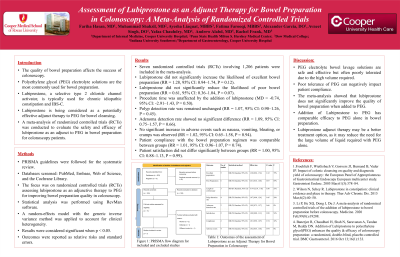Sunday Poster Session
Category: Practice Management
P1495 - Assessment of Lubiprostone as an Adjunct Therapy for Bowel Preparation in Colonoscopy: A Meta-Analysis of Randomized Controlled Trials
Sunday, October 27, 2024
3:30 PM - 7:00 PM ET
Location: Exhibit Hall E

Has Audio

Fariha Hasan, MD
Cooper University Hospital
Philadelphia, PA
Presenting Author(s)
Fariha Hasan, MD1, Muhammad Shahzil, MD2, Ayesha Liaquat, MBBS3, Fatima Farooqi, 3, Avneet Singh, DO4, Alexander Garcia, DO4, Muhammad YN. Chaudhary, MBChB5, Andrew Alabd, MD4, Rachel Frank, MD6
1Cooper University Hospital, Philadelphia, PA; 2Penn State Health Milton S. Hershey Medical Center, Hershey, PA; 3Dow Medical College, Karachi, Sindh, Pakistan; 4Cooper University Hospital, Camden, NJ; 5Indiana University Southwest, Evansville, IN; 6Cooper University Hospital, Mt. Laurel, NJ
Introduction: The quality of bowel preparation influences the success of colonoscopy. Currently, osmotically balanced polyethylene glycol (PEG) electrolyte bowel lavage solutions are most commonly used for bowel preparation. However, more recently, lubiprostone, a selective type 2 chloride channel activator used for chronic idiopathic constipation and IBS-C, is believed to be a potentially effective adjunct therapy to PEG for bowel cleansing. We conducted a meta-analysis of randomized controlled trials (RCTs) to assess the safety and efficacy of lubiprostone adjunct therapy to PEG for bowel preparation among patients undergoing colonoscopy.
Methods: PubMed, Embase, Web of Science, and the Cochrane Library were systematically screened for RCTs assessing lubiprostone as an adjunctive therapy to PEG in improving the quality of bowel preparation for colonoscopy. Standard meta-analysis methods were employed using the random-effects model, with the inverse method used for heterogeneity, and results were considered significant when p < 0.05. The outcomes were reported as relative risks and standard errors.
Results: Seven RCTs involving 1206 patients were included in this meta-analysis. The addition of lubiprostone did not increase the likelihood of an excellent bowel preparation [RR = 1.28, 95% CI: 0.94-1.74, P = 0.12], nor did it contribute to a poor bowel preparation [RR = 0.61, 95% CI: 0.36–1.04; P = 0.07]. Similarly, it did not affect the procedure time [MD = -0.74, 95% CI: -2.91–1.43; P = 0.50], polyp detection rate [RR = 1.07, 95% CI: 0.90–1.26; P = 0.45], or adenoma detection rate [RR = 1.09, 95% CI: 0.75–1.57; P = 0.66]. Additionally, no significant change was observed in the number of adverse events [RR = 1.02, 95% CI: 0.65-1.58; P = 0.94], including nausea, vomiting, abdominal bloating, and abdominal cramps. Lastly, comparable patient compliance [RR = 1.01, 95% CI: 0.96–1.07; P = 0.74] and satisfaction [RR = 1.00, 95% CI: 0.88–1.13; P = 0.99] were seen in both groups.
Discussion: Despite being safe and efficacious, PEG electrolyte bowel lavage solutions are prone to poor tolerance due to a high formula volume, which negatively impacts compliance. According to the results of our meta-analysis, lubiprostone has no significant additive effect on the quality of bowel preparation prior to colonoscopy. However, given its comparable efficacy to PEG, lubiprostone adjunct therapy may be the superior treatment option, potentially mitigating the need for a high volume of liquid associated with PEG alone.
Note: The table for this abstract can be viewed in the ePoster Gallery section of the ACG 2024 ePoster Site or in The American Journal of Gastroenterology's abstract supplement issue, both of which will be available starting October 27, 2024.
Disclosures:
Fariha Hasan, MD1, Muhammad Shahzil, MD2, Ayesha Liaquat, MBBS3, Fatima Farooqi, 3, Avneet Singh, DO4, Alexander Garcia, DO4, Muhammad YN. Chaudhary, MBChB5, Andrew Alabd, MD4, Rachel Frank, MD6. P1495 - Assessment of Lubiprostone as an Adjunct Therapy for Bowel Preparation in Colonoscopy: A Meta-Analysis of Randomized Controlled Trials, ACG 2024 Annual Scientific Meeting Abstracts. Philadelphia, PA: American College of Gastroenterology.
1Cooper University Hospital, Philadelphia, PA; 2Penn State Health Milton S. Hershey Medical Center, Hershey, PA; 3Dow Medical College, Karachi, Sindh, Pakistan; 4Cooper University Hospital, Camden, NJ; 5Indiana University Southwest, Evansville, IN; 6Cooper University Hospital, Mt. Laurel, NJ
Introduction: The quality of bowel preparation influences the success of colonoscopy. Currently, osmotically balanced polyethylene glycol (PEG) electrolyte bowel lavage solutions are most commonly used for bowel preparation. However, more recently, lubiprostone, a selective type 2 chloride channel activator used for chronic idiopathic constipation and IBS-C, is believed to be a potentially effective adjunct therapy to PEG for bowel cleansing. We conducted a meta-analysis of randomized controlled trials (RCTs) to assess the safety and efficacy of lubiprostone adjunct therapy to PEG for bowel preparation among patients undergoing colonoscopy.
Methods: PubMed, Embase, Web of Science, and the Cochrane Library were systematically screened for RCTs assessing lubiprostone as an adjunctive therapy to PEG in improving the quality of bowel preparation for colonoscopy. Standard meta-analysis methods were employed using the random-effects model, with the inverse method used for heterogeneity, and results were considered significant when p < 0.05. The outcomes were reported as relative risks and standard errors.
Results: Seven RCTs involving 1206 patients were included in this meta-analysis. The addition of lubiprostone did not increase the likelihood of an excellent bowel preparation [RR = 1.28, 95% CI: 0.94-1.74, P = 0.12], nor did it contribute to a poor bowel preparation [RR = 0.61, 95% CI: 0.36–1.04; P = 0.07]. Similarly, it did not affect the procedure time [MD = -0.74, 95% CI: -2.91–1.43; P = 0.50], polyp detection rate [RR = 1.07, 95% CI: 0.90–1.26; P = 0.45], or adenoma detection rate [RR = 1.09, 95% CI: 0.75–1.57; P = 0.66]. Additionally, no significant change was observed in the number of adverse events [RR = 1.02, 95% CI: 0.65-1.58; P = 0.94], including nausea, vomiting, abdominal bloating, and abdominal cramps. Lastly, comparable patient compliance [RR = 1.01, 95% CI: 0.96–1.07; P = 0.74] and satisfaction [RR = 1.00, 95% CI: 0.88–1.13; P = 0.99] were seen in both groups.
Discussion: Despite being safe and efficacious, PEG electrolyte bowel lavage solutions are prone to poor tolerance due to a high formula volume, which negatively impacts compliance. According to the results of our meta-analysis, lubiprostone has no significant additive effect on the quality of bowel preparation prior to colonoscopy. However, given its comparable efficacy to PEG, lubiprostone adjunct therapy may be the superior treatment option, potentially mitigating the need for a high volume of liquid associated with PEG alone.
Note: The table for this abstract can be viewed in the ePoster Gallery section of the ACG 2024 ePoster Site or in The American Journal of Gastroenterology's abstract supplement issue, both of which will be available starting October 27, 2024.
Disclosures:
Fariha Hasan indicated no relevant financial relationships.
Muhammad Shahzil indicated no relevant financial relationships.
Ayesha Liaquat indicated no relevant financial relationships.
Fatima Farooqi indicated no relevant financial relationships.
Avneet Singh indicated no relevant financial relationships.
Alexander Garcia indicated no relevant financial relationships.
Muhammad Chaudhary indicated no relevant financial relationships.
Andrew Alabd indicated no relevant financial relationships.
Rachel Frank indicated no relevant financial relationships.
Fariha Hasan, MD1, Muhammad Shahzil, MD2, Ayesha Liaquat, MBBS3, Fatima Farooqi, 3, Avneet Singh, DO4, Alexander Garcia, DO4, Muhammad YN. Chaudhary, MBChB5, Andrew Alabd, MD4, Rachel Frank, MD6. P1495 - Assessment of Lubiprostone as an Adjunct Therapy for Bowel Preparation in Colonoscopy: A Meta-Analysis of Randomized Controlled Trials, ACG 2024 Annual Scientific Meeting Abstracts. Philadelphia, PA: American College of Gastroenterology.
